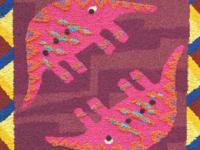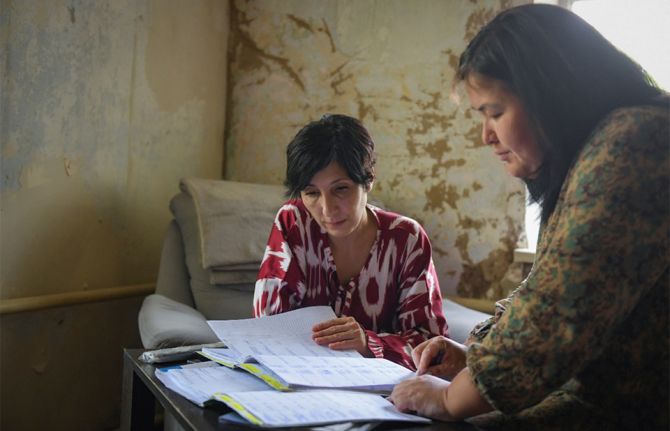
Feature Story
Artists in Russia come together to spread awareness about HIV
18 November 2009
18 November 2009 18 November 2009
Yulia Lasker, Russian singer, who purchased a tapestry at the opening of the exhibition.
Credit: UNAIDS
UNAIDS and the All-Russian Union of People Living with HIV came together for the second time to support the international project Art Against AIDS that unites well-known artists in the response to the HIV epidemic in Russia. This year, proceeds from the sale of art at the exhibition went to low-income families raising children living with HIV.
More than 30 contemporary artists, photographers, and musicians from Russia, the United States, Japan, Greece and Spain offered their work for the charitable exhibition-sale held at the Central House of Artists from 12 - 26 November 2009. Last year, funds raised during the exhibition-sale went to children living with HIV at the Vsevolozhsk Orphanage in Leningrad Oblast.
There is increasing political and financial commitment for universal access to HIV prevention, treatment and care in Russia, even in the face of a global financial crisis. The country is set to increase the number of people on antiretroviral treatment by 50,000 in 2009. Through this exhibition, artists, photographers and musicians are helping to speak openly about HIV and to draw the attention of the wider public towards this issue.

One of the art pieces sold at the launch of Art Against AIDS on the 12 of November.
Credit: UNAIDS
Earlier in October during the 3rd HIV/AIDS Conference in Eastern Europe and Central Asia, UNAIDS Executive Director Michel Sidibé said that there has been progress in the region with many countries set to achieve universal access target goals. But the UNAIDS head also noted that the AIDS epidemic continues to outpace the response as the estimated number of adults and children living with HIV in the Eastern Europe and Central Asia region has doubled since 2001.
Injecting drug use is the main mode of HIV transmission across Eastern Europe and Central Asia. HIV prevention among drug users and their sexual partners is a vital component of an evidence-informed response. Although the HIV epidemic in the Russian Federation is the largest in the region, there are rising numbers in Azerbaijan, Georgia, Kazakhstan, Kyrgyzstan, the Republic of Moldova, Tajikistan, and Uzbekistan.
Artists in Russia come together to spread awarene
Key populations:
Cosponsors:
Feature stories:
“Artists Against AIDS” help fight stigma and discrimination in Russia (17 November 2008)
All-Russian Union of People Living with HIV (09 July 2009)
“Art for AIDS” receives Keith Haring sculptures (27 November 2008)
"Stars against AIDS" in Eastern Europe (19 May 2008)



